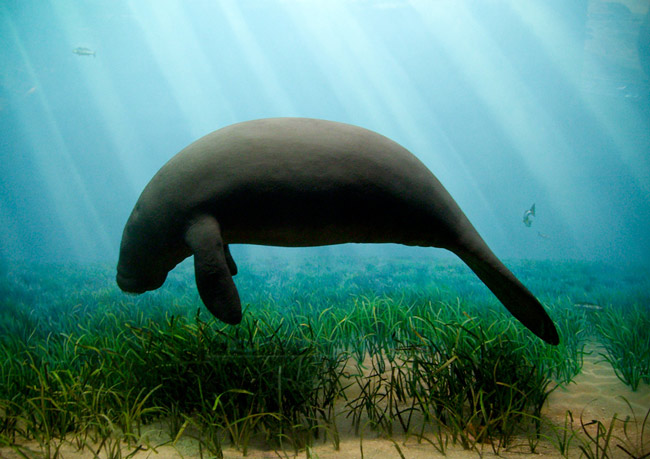
By Katie Tripp
We’ve all heard the stories, seen the online videos, or perhaps done it ourselves – thrown a head of lettuce to a manatee, stuck a running hose over the side of the dock, or approached a group of manatees in shallow water. Many people don’t realize that such acts are not only detrimental to wild manatees, but also illegal. Manatees are protected by two federal laws that prohibit harming individuals of these species. These laws are the Endangered Species Act (ESA) and the Marine Mammal Protection Act. The ESA defines harm to include “significant habitat modification or degradation where it actually kills or injures wildlife by significantly impairing essential behavioral patterns, including breeding, feeding, or sheltering.”
When manatees are given food or water, their natural behavior is changed; their feeding patterns are disrupted; and their travel and migration may also be affected. Furthermore, encouraging manatees to approach boat docks is a bad idea since watercraft are a significant contributor to manatee injury and mortality. Manatees are experts at finding food and fresh water – they don’t need our assistance. Quite the contrary, they will do far better if we can give them a wide berth and keep our distance.
When manatees are congregated in shallow water during the warm months of the year, most often they are engaging in mating activity. When people swarm around these manatees, trying to get a closer look, they run the risk of disturbing the mating behavior of an endangered species, which is also against the law. While it can be exciting to see a manatee up close, it is really important to think about the consequences of our actions. You may have just been trying to get a quick photo, but did you just interrupt a male manatee that was getting ready to mate? As with all things in life, our choices have consequences, and we need to be aware of these implications.
If you want to help manatees, advocate for protection of seagrass beds and Florida’s rivers and springs, where manatees naturally get their food and water. If you see one or more manatees being fed, given water, or disturbed, call the Florida Fish and Wildlife Conservation Commission at 1-888-404-3922. Save the Manatee Club’s free, family-friendly public awareness manatee signs are available for sites where human/manatee interactions are a problem. E-mail the Club at [email protected] with the site information.
![]()
Katie Tripp has been Save the Manatee Club’s Director of Science and Conservation since May of 2008. She received her Ph.D. in Veterinary Medical Sciences from the University of Florida, where she conducted research on manatee physiology. For more manatee protection tips for divers and swimmers, visit Save the Manatee Club’s website.





























Geezer says
I have driven to Blue Spring just to get a better look at these wonderful creatures.
What a pity that more of us don’t marvel at and appreciate manatees.
I favor any efforts to protect this and other threatened species.
Like the car commercial proclaims: “Whatever it takes.”
Anonymous says
We love manatees.